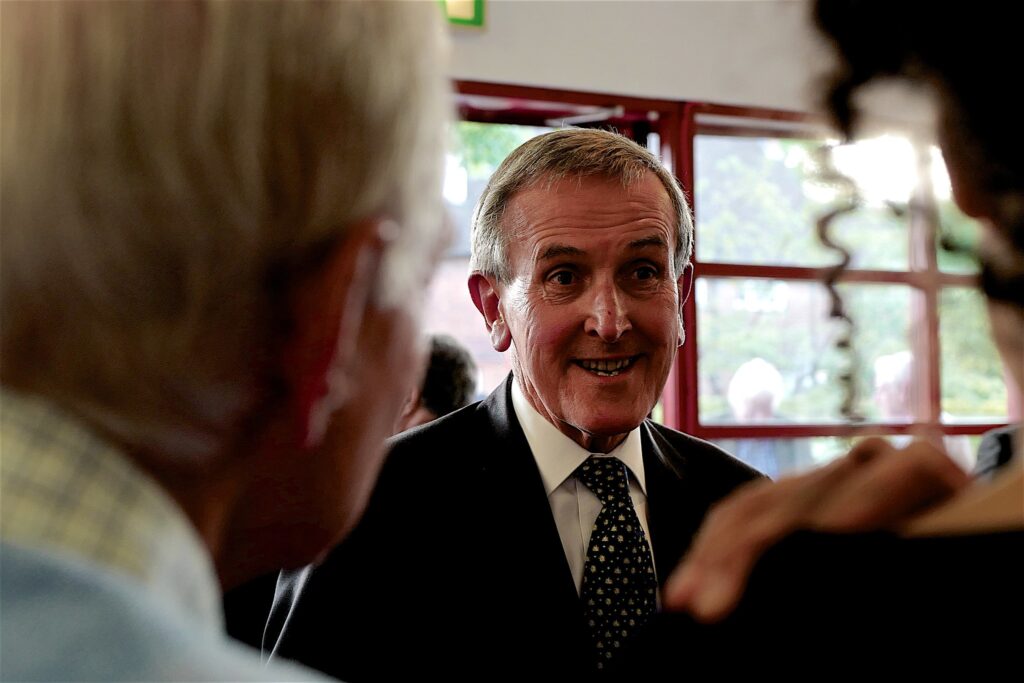Neil McGregor
The former Director of the British Museum, and now the founding Director of the Humboldt Forum in Berlin, photographed after a lecture in College.
Quote of the Day
”If the war didn’t happen to kill you it was bound to start you thinking. After that unspeakable idiotic mess you couldn’t go on regarding society as something eternal and unquestionable, like a pyramid. You knew it was just a balls-up.”
- George Orwell, in Coming Up for Air
Funnily enough, contemplating the Covid catastrophe and the likely aftermath, this quotation keeps coming to mind.
Musical alternative to the morning’s radio news
Randy Newman | Political Science
One of my favourite songs: a sardonic masterpiece.
Long Read of the Day
What it’s like driving for Uber or Lyft
This post is thoughtful, reflective and illuminating. It’s by someone who isn’t driving out of real economic need, but out of choice and — initially, anyway, curiosity. Best thing I’ve read on the subject so far, though I’m sure there are lots of similar reflections if only one had time to search for them.
Thanks to Quentin for spotting it.
Beware Goldman workhorses, deferred gratification is the worst kind
Corporate life demands more of youth than it can later repay
Lovely FT column by Janan Ganesh, triggered by the revelations of the costs of spending your 20s and 30s slaving for investment banks and elite law firms.
It’s probably behind the paywall, but here’s the interesting (and wise) gist:
Graduates, courted by banks and the like, might not resent a pointer or two from the generation above. Mine is to think very hard before trading the reality of present hardships for notional joys down the line.
Drink, sex and travel are among the pleasures that call on energies that peak exactly as graduate bankers are wasting them on work
The ageing process — as I have lived it, as I have observed it in friends — has convinced me of one thing above all. The deferral of gratification is the easiest life mistake to make. And by definition among the least reversible. A unit of leisure is not worth nearly as much in late or even middle age as it is in one’s twenties. To put it in Goldman-ese, the young should discount the future more sharply than prevailing sentiment suggests.
The first reason should be obvious enough, at least after the past 12 months. There is no certainty at all of being around to savour any hard-won spoils. The career logic of an investment banker (or commercial lawyer, or junior doctor) assumes a normal lifespan, or thereabouts. And even if a much-shortened one is an actuarial improbability, a sheer physical drop-off in the mid-thirties is near-certain. Drink, sex and travel are among the pleasures that call on energies that peak exactly as graduate bankers are wasting them on work.
And the moral: Pleasures deferred can be pleasures foregone.
I’ve lost count of the number of promising lives I’ve seen ruined by the pursuit of ‘career success’ and wealth.
Mutale Nkonde on How Biased Tech Design and Racial Disparity Intersect
This is a terrific podcast conversation between Taylor Owen and an extraordinary activist and founder of AI for People. In their conversation Mutale and Taylor discuss the many ways in which technology reflects and amplifies bias.
Many of the issues begin when software tools are designed by development teams that lack diversity or actively practise forms of institutional racism, excluding or discouraging decision-making participation by minority ethnic group members. Another problem is the data sets included in training the systems; as Nkonde explains, “Here in the United States, if you’re a white person, 70 percent of white people don’t actually know a Black person. So, if I were to ask one of those people to bring me a hundred pictures from their social media, it’s going to be a bunch of white people.” When algorithms that are built with this biased data make it into products — for use in, say, law enforcement, health care and financial services — they begin to have serious impacts on people’s lives, most severely when law enforcement misidentifies a suspect. Among the cases coming to light, “in New Jersey, Nijeer Parks was not only misidentified by a facial recognition system, arrested, but could prove that he was 30 miles away at the time,” Nkonde recounts. “But, because of poverty, Parks ended up spending 10 days in jail, because he couldn’t make bail. And that story really shows how facial recognition kind of reinforces other elements of racialized violence by kind of doubling up these systems.” Which is why Nkonde is working to ban facial recognition technology from use, as well as fighting for other legislation in the United States that will go beyond protecting individual rights to improving core systems for the good of all.
It’s 46 minutes long, but worth every minute.
This blog is also available as a daily email. If you think this might suit you better, why not subscribe? One email a day, delivered to your inbox at 7am UK time. It’s free, and there’s a one-click unsubscribe if you decide that your inbox is full enough already!

